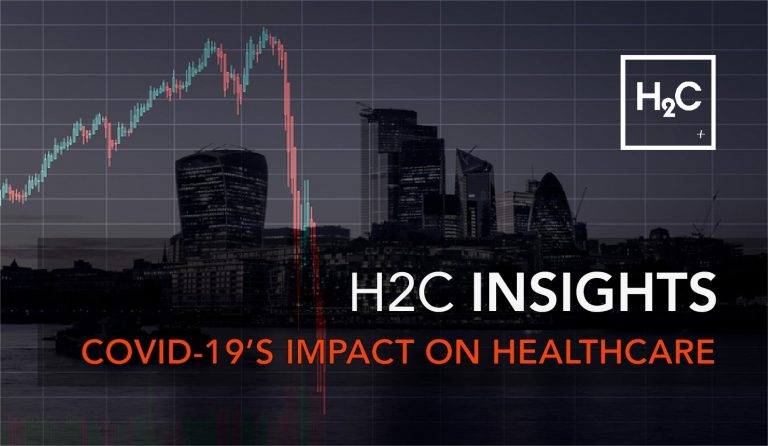H2C PERSPECTIVES • CAPITAL MARKETS • APRIL 9, 2020
 Navigating a New Normal: How COVID-19 Impacts Healthcare Finance
Navigating a New Normal: How COVID-19 Impacts Healthcare Finance
The crisis created by the coronavirus outbreak has profoundly disrupted capital markets activity and negatively altered credit outlooks for not-for-profit hospitals and health systems, presenting credit concerns for healthcare leaders. As leaders navigate a rapidly changing environment, they should stress test their organization’s capital position as well as financial covenants under existing borrowing agreements to understand the essential implications. They should also proactively discuss their approach to mitigating financial challenges with bond investors, banks, and rating agencies.
Capital markets. Initially, the market for long-term, fixed-rate tax-exempt and taxable bonds, which had reached historically strong levels as recently as the end of February, seized up as investors sold securities and withdrew nearly $30 billion from bond funds to move into cash in a sudden and unprecedented manner. At the same time, banks—another important source of capital for healthcare providers—were inundated with requests for lines of credit from health systems to fund working capital needs and potential operating shortfalls as an alternative to liquidating their investment portfolios at such steep losses. Additionally, the market for variable-rate demand bonds (VRDBs) destabilized in March, with rates reaching as high as 10%+ in some cases and remarketing agents holding up to $27 billion in VRDBs on their balance sheets compared with typical inventories of $5 to $6 billion.
Since the beginning of the crisis less than four weeks ago, volatility continues in the long-term bond market, with very modest levels of newly issued bonds for health systems. Banks are managing the demands for their capital by increasing rates on revolving lines of credit while requesting higher fees for originating lines of credit and on unused balances, as well as building expectations for non-credit revenues from customers quickly. Fortunately, the VRDB market has largely stabilized due to promises of support from the Federal Reserve, with rates on daily-reset VRDBs below 0.50% and balances held by investment banks declining to their customary levels.
Rating agencies. Acknowledging the challenges facing health systems, all three rating agencies have changed their outlooks on the not-for-profit healthcare sector from stable to negative within the past two weeks, driven by expected material deterioration in operations and weaker balance sheet metrics as investment portfolios declined with the equity market sell-off. The combination of forces impacting hospitals simultaneously is truly staggering:
- A massive drop in hospital revenues due to the indefinite suspension of elective procedures and outpatient visits
- Rising expenses for supplies, labor, and equipment
- Financial market volatility that has damaged the values of investment portfolios and weakened previously strong balance sheets
While Moody’s, S&P, and Fitch have communicated that they are unlikely to take a one-size-fits-all approach when reviewing health system credits, they have also acknowledged that larger, multi-hospital systems with strong cash flow margins and days cash on hand pre-crisis will come out of this challenging environment better than smaller health systems or those with pressures on profitability and liquidity. The rating agencies have also been proactively reaching out to health systems in their portfolio about how the coronavirus is affecting strategies, volumes, liquidity, and working capital.
Covenant considerations. A critical issue for health systems to review and understand is the potential for triggering events of default in their credit documents. Most health systems have financial covenants in their master trust indentures and bank documents to maintain positive debt service coverage, and many have additional covenants around liquidity (minimum days cash on hand) and leverage (maximum debt-to-capitalization). As health systems experience negative cash flow for an extended period, maintaining positive debt service coverage may become more difficult, and the combination of negative operating cash flow and declines in equity and fixed-income markets could put pressure on some health systems’ ability to meet liquidity covenants.
Depending on the required timing of the covenant calculations, financial covenant defaults may manifest themselves sooner rather than later. Providers that have fiscal years ending in June or September or that measure covenants on a quarterly basis could face near-term challenges with investors and lenders.
Organizations will need to understand the implications of failing a financial covenant test and should develop a strategy to communicate proactively with rating agencies, investors, and the master trustee. Key opportunities to consider in monitoring covenant violations are the accounting treatment for government grants, force majeure clauses that may include epidemics or pandemics, and government restrictions that may exempt failing a debt service coverage test provided there is no payment default. In this environment, it is imperative that healthcare leaders stress test their financial covenants to understand the potential implications.
If this crisis lasts longer than expected, these financial challenges will begin to affect health systems with even the highest ratings.
About Hammond Hanlon Camp LLC
Hammond Hanlon Camp LLC (“H2C”) is an independent strategic advisory and investment banking firm committed to providing superior advice as a trusted advisor to healthcare organizations and related companies throughout the United States. H2C’s professionals have a long track record of success in healthcare mergers and acquisitions, capital markets, real estate, and restructuring transactions, acting as lead advisors on hundreds of transactions representing billions of dollars in value.
Hammond Hanlon Camp LLC conducts securities-related engagements through its wholly-owned subsidiary, H2C Securities Inc., member FINRA/SIPC.
For more information, visit h2c.com.
New York
623 Fifth Avenue
29th Floor
New York, NY 10022
212 257 4500
Atlanta
3333 Piedmont Road
Suite 725
Atlanta, GA 30305
404 937 1350
Chicago
311 S. Wacker Drive
Suite 5425
Chicago, IL 60606
312 508 4200
San Diego
4655 Executive Drive
Suite 280
San Diego, CA 92121
858 242 4800
Media Contact
Kelly Duong
858 242 4810
kduong@h2c.com
The full content of this article is only available to paid subscribers. If you are an active subscriber, please log in. To subscribe, please click here: SUBSCRIBE





